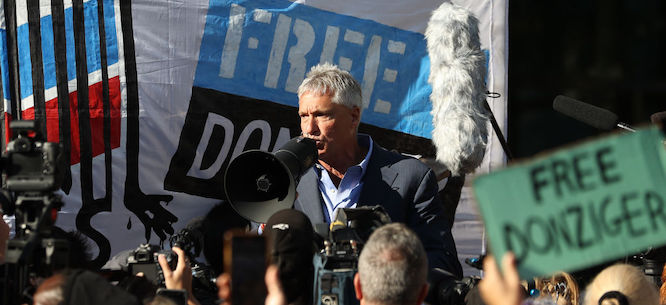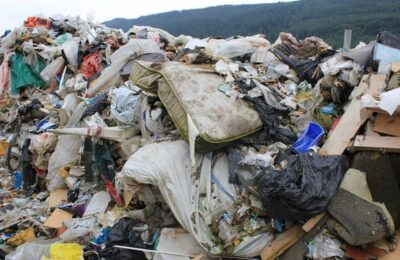From Dissent Magazine, this article looks at Chevron’s campaign of intimidation against climate activists.
Aaron Regunberg writes:
The oil company hopes that the imprisonment of Steven Donziger has a chilling effect on environmental litigation. But it might have galvanized a new generation to take on the fossil fuel industry.

One night in early 2020, Steven Donziger called into a meeting of first-year law students from his house arrest. We were organizing against the legal industry’s role in the climate crisis—we had recently held a series of demonstrations targeting recruitment events for firms representing Big Oil—and were familiar with Donziger’s work representing indigenous Ecuadorians in the largest lawsuit ever won against a fossil fuel company. Still, we were not prepared for the full weight of his story, or what it said about the legal system we would soon be joining.
Between 1964 and 1992, Chevron (then Texaco) illegally dumped 16 billion gallons of toxic waste in Ecuador’s rainforest, a disaster—later nicknamed the Amazon Chernobyl—that contaminated rivers and groundwater, destroyed forests and farms, and set off waves of cancer and birth defects in communities across an area of ancestral indigenous land the size of Rhode Island. Impoverished victims of corporate malfeasance rarely have the resources to challenge their tormentors in court. But in 1993, indigenous and campesino activists fighting to support “Los Afectados,” the name used for those affected by the public health crises that Chevron’s pollution created, asked a young lawyer named Steven Donziger to help them take legal action. In 1994, this coalition founded the Frente de Defensa de la Amazonia (FDA).
Donziger and FDA worked together to bring a class-action lawsuit demanding justice on behalf of 30,000 Afectados. And in 2011, after nearly two decades of litigation and advocacy, a Chevron-instigated venue change from New York to Ecuador, eight years at trial, and three levels of appeals, Donziger and FDA won. An Ecuadorian court ordered the company to pay $18 billion—later reduced to $9.5 billion—to clean up its toxic waste and provide for the health needs of the people it had poisoned. In 2018, Ecuador’s highest court upheld the judgment.
This final ruling should have been all that was needed to secure environmental justice and medical support for these communities. Chevron had already retained over sixty law firms, 2,000 lawyers, and six public relations companies in this case, and invested countless millions on litigation, appeals, venue changes, and every other defense and delay tactic imaginable. But instead of accepting the court’s decision, as Chevron had pledged to do when pushing to move the litigation to Ecuador, the company sold its assets in Ecuador so its debt could not be collected locally and launched a concentrated retaliatory attack against Donziger and the victims he represented. Internal Chevron memos were explicit about the gameplan: “Our [long-term] strategy is to demonize Donziger.”
Chevron partnered with the cutthroat corporate law firm Gibson Dunn to marshal coercion, bribery, and litigation against Donziger and his clients. The company paid approximately $2 million in cash and benefits to disgraced former Ecuadorian judge Alberto Guerra—who had already been removed from the bench for accepting bribes—to claim that Donziger had bribed a different judge in the Chevron trial. On this basis, Chevron brought a case against Donziger and his plaintiffs in the U.S. District Court for the Southern District of New York under the Racketeer Influenced and Corrupt Organizations Act (RICO). No corroborating evidence was ever offered for Guerra’s testimony, which was proven false by a 2013 forensic investigation of his computer. In fact, Guerra himself later admitted to lying in his sworn testimony. But that did not matter to Chevron’s preferred judge for the case, Lewis Kaplan, a former corporate lawyer who refused to disclose that he held significant financial investments in Chevron at the time of this trial.
Kaplan blocked collection of the company’s court-ordered $9.5 billion payment to its Ecuadorian victims. And when Donziger refused to violate attorney-client privilege and endanger vulnerable environmental activists in Ecuador by handing over to Chevron years of sensitive communications, Kaplan charged him with criminal contempt and kept him under house arrest for two years, an act the United Nations High Commissioner for Human Rights decried as a violation of international law. The Commissioner also ruled that Donziger was denied the right to a fair trial, writing that the judges in his case had shown “a staggering lack of objectivity and impartiality.” Nevertheless, last month Donziger was sentenced to six months in prison. He surrendered himself on October 27th.
When I first heard Donziger’s story, not all of the horror it inspired in me was altruistic in nature. Learning the lengths that companies like Chevron will go to destroy those who challenge them added a frightening dimension to the work my friends and I hoped to do.
Intimidation is precisely the purpose of these scorched-earth legal strategies. Yes, Chevron has been fighting to avoid paying back the material costs of the lives and lands it destroyed in Ecuador. But its litigation teams know that attacking Donziger serves the company’s interests in another way as well: by sending the message to affected communities and lawyers that taking on these corporations is simply not worth the cost.
There’s a name for these tactics in the legal field: Strategic Lawsuits Against Public Participation, or SLAPP suits—legal actions taken by deep-pocketed interests that use the court system to bully or bankrupt those with fewer resources. As the American Civil Liberties Union put it, “SLAPP suits pervert our legal system by turning it into a war of attrition, a place where who is right and who is wrong does not matter nearly as much as who has the most resources.”
Fossil fuel companies and the corporate law firms that represent them know how effectively SLAPP suits can silence their critics. Chevron’s firm of choice, Gibson Dunn, has been fined by the Montana Supreme Court for “legal thuggery” and “blatantly and maliciously trying to intimidate” its opponents. A New York federal judge sanctioned the firm for “unacceptable shenanigans,” and a California federal judge found Gibson Dunn’s misconduct to be “a product of a culture which permeates” the firm. ExxonMobil and its go-to firm, Paul, Weiss (where Judge Kaplan himself used to work), deployed the same strategies to target advocates pursuing climate liability litigation. The attorney general of Massachusetts called Paul, Weiss’s tactics on behalf of Exxon “absurd” and “blatantly obstructionist.” Exxon’s SLAPP suits against public officials seeking to hold it accountable for the climate crisis were described by a federal judge in New York as an “extraordinary” attempt to “stop state officials from conducting duly-authorized investigations into potential fraud,” based on “extremely thin allegations” that are altogether “implausible.” And the former attorney general of Maine characterized Exxon’s litigation strategy as “an attempt to chill government’s ability to investigate malfeasance.”
While these tactics are not new, Chevron’s attacks on Donziger represent a serious escalation. If Chevron’s example holds—if it becomes clear that companies can use SLAPP suits and the U.S. judicial system to defy another nation’s supreme court and invalidate billions in damages—then fossil fuel companies have a clear blueprint to avoid accountability. And if Donziger’s imprisonment is not contested—if oil and gas companies see that they can push their adversaries into prison without blowback—then the suppressive effects on movement litigation could be enormous, at the exact moment when we need to challenge the fossil fuel industry like never before.
Still, I’m not so sure Chevron’s intimidation strategy will succeed. When our phone call with Donziger ended on that night almost two years ago, my fellow law students and I turned to each other to ask the question on all of our minds: did we want to continue organizing against companies like Chevron and Gibson Dunn despite the risks involved? I looked around the room and saw the doubt on my friends’ faces turn to anger, and then to determination. We had to continue this fight.
The outrage around Donziger’s case demonstrates that we weren’t alone in that reaction, and that for countless people, Chevron’s corrupt SLAPP tactics are just as galvanizing as they are intimidating. Chevron’s leaders wanted to make an example of Donziger so that when the next Amazon Chernobyl hit, potential advocates would be too fearful to follow in his footsteps. But by elevating a model for aspiring lawyers to emulate, it may have inspired a generation of future Donzigers to build a movement so powerful that it can’t be silenced.
Aaron Regunberg is a longtime progressive organizer and former Rhode Island state representative. He is currently a third-year student at Harvard Law School and sits on the national board of Law Students for Climate Accountability.


